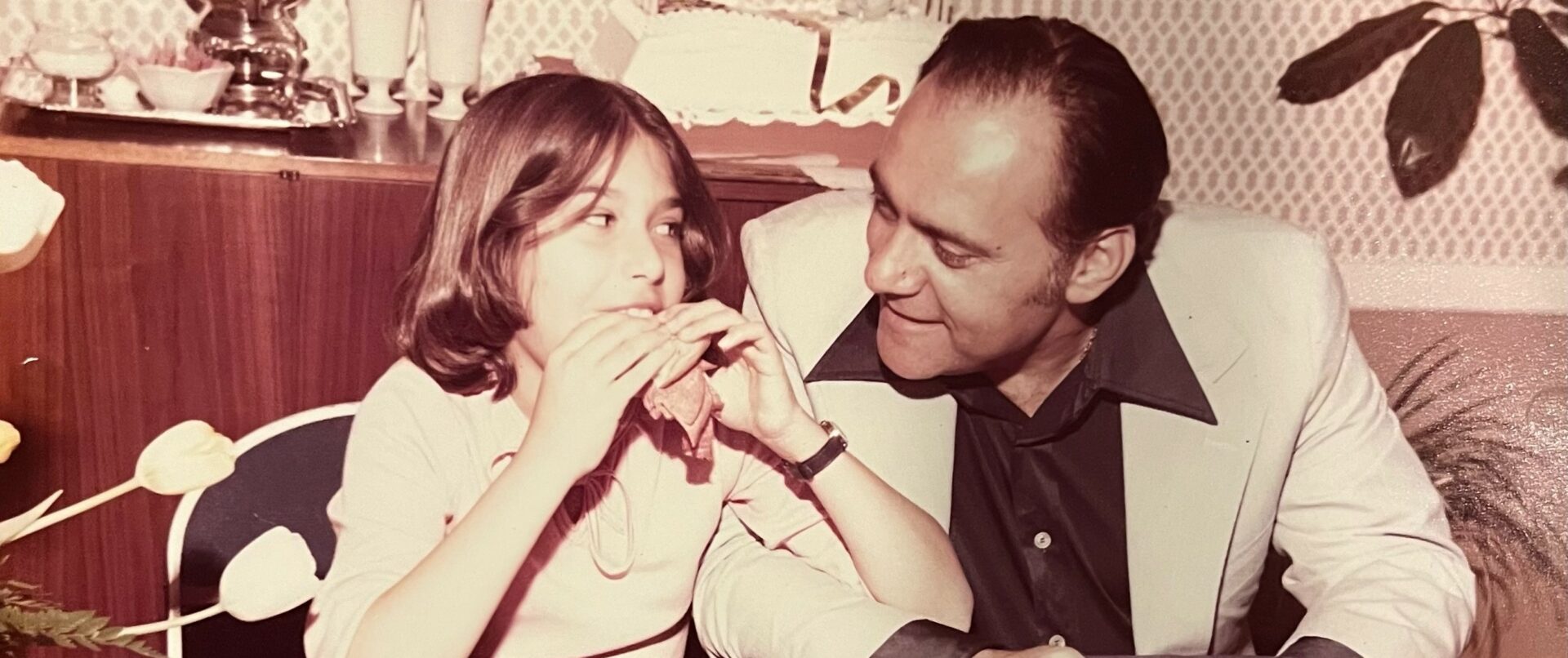On a quiet, snowy, Sunday morning, my dad had a heart attack and died. He was 48. I was 15. And his death was the defining event of my life. Awakened from a sound sleep to my mother screaming my dad’s name —and then mine—I bolted out of bed. Shivering in a t-shirt and my dad’s shoes, I ran next door through the snow to get our neighbor, a volunteer fireman. Then I sank down on our steps and covered my eyes, as my father was carried past me and out of our house. That day and the days that followed were like a bad dream that I couldn’t wake up from.
I wish I knew then what I know now, 40 years later. That I would get through that moment, those days, the next four decades. That I’d live a life so much longer than my dad’s—a life filled with love, family, memories, and an appreciation for all of it, knowing how quickly it can vanish. A life I never could have imagined—where grief isn’t the foreground, but more a subtle background texture in my mind and heart.
Here’s what I would go back and tell my 15-year old self about navigating grief.
Let yourself feel it all.
After the initial shock had started to subside, and I was back at school, I remember lots of days where I would try to put off the grief. “I’ll think about it later,” I’d tell myself. But later I had to focus on homework. And at the end of the day, I didn’t want to think about it at night, because I was afraid it would be hard to fall asleep. Here’s the thing, though. You can only run from grief for so long. Eventually, it catches up with you. Feel the feels. Cry the tears. Curse fate. Hate the world. Resent your friends who complain about their dads. Set aside time to think about your dad. To miss him. To cry. And don’t set any expectations about how long it will take you to feel better. Grief is a process that will go on, in varying ways, for the rest of your life.
Don’t go it alone.
While grief can sometimes feel really solitary, it’s important to reach out to other people. Don’t try so hard to be strong for other people. Ask for help. Family, friends, a favorite teacher, a professional therapist are crucial. Talk to your mom and sister and brother about your dad. I know it’s hard. But it will help you not only process the loss, but also deepen and solidify your memories about your dad. Hang out with close friends. Whether you’re crying together, having deep convos, talking about nothing, scrolling on social media, eating junk food, laughing, gossiping, they’ll distract you, support you, save you more than you know. You guys will become an extended family – and some of those bonds are gonna last a lifetime.
Also, agree to see a therapist. It’s already hard enough, make it a little easier by letting a professionals help you navigate the experience. And sometimes, you won’t find the therapist on the first try. Be open to talking to different people until you find the right fit.
It’s okay to enjoy life.
You’ve lost your dad – but you’re still here. It’s ok to let yourself have some fun. Don’t feel guilty for going out on Saturday night – go to the dinner, the party, the movie, the dance – your mom will be alright. Just because you smile, laugh, and have a good time doesn’t mean you miss your dad any less. And staying home, shutting yourself off from life, won’t bring him back. It will just make being here without him that much harder.
It won’t always feel like this.
Over the course of your life, your grief will fluctuate. The sharp pain will become more of a dull ache. You’ll have good days and bad ones. Sometimes birthdays and holidays will reduce you to tears – sometimes they won’t. One day you’ll realize that weeks—maybe months—have gone by without thinking about it. Milestones will always feel bittersweet – graduations, your wedding day, becoming a mom. Not having your dad to share those with will always feel tough – and so unfair – but photos, memories, sharing stories, seeing his traits reflected in your kids, feeling grateful for the awesome dad you had— eventually those will become the dominant emotions in those moments.
It may seem impossible to believe, but over time, grief will show up with less frequency and intensity. Crushing grief feels like it will last forever. But trust me, it won’t. You got this.
 Nancy Burrows is an OG Nickelodeon promo writer and producer who pivoted when her son was diagnosed with autism. She has spent the past two decades writing about autism and working to create a more inclusive world, and is the author of Chicken Soup for the Soul: Raising Kids on the Spectrum. Having lost her dad at 15, Nancy cares deeply about sharing her experience with grief in the hopes of helping others. Her reflections on grief have appeared in Best Self Magazine, and Chicken Soup for the Soul.
Nancy Burrows is an OG Nickelodeon promo writer and producer who pivoted when her son was diagnosed with autism. She has spent the past two decades writing about autism and working to create a more inclusive world, and is the author of Chicken Soup for the Soul: Raising Kids on the Spectrum. Having lost her dad at 15, Nancy cares deeply about sharing her experience with grief in the hopes of helping others. Her reflections on grief have appeared in Best Self Magazine, and Chicken Soup for the Soul. 